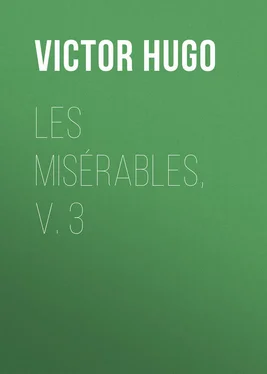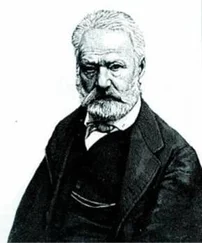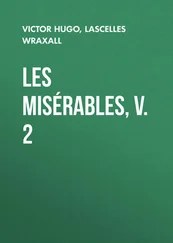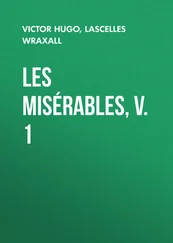Victor Hugo - Les Misérables, v. 3
Здесь есть возможность читать онлайн «Victor Hugo - Les Misérables, v. 3» — ознакомительный отрывок электронной книги совершенно бесплатно, а после прочтения отрывка купить полную версию. В некоторых случаях можно слушать аудио, скачать через торрент в формате fb2 и присутствует краткое содержание. Жанр: literature_19, foreign_antique, foreign_prose, на английском языке. Описание произведения, (предисловие) а так же отзывы посетителей доступны на портале библиотеки ЛибКат.
- Название:Les Misérables, v. 3
- Автор:
- Жанр:
- Год:неизвестен
- ISBN:нет данных
- Рейтинг книги:4 / 5. Голосов: 1
-
Избранное:Добавить в избранное
- Отзывы:
-
Ваша оценка:
- 80
- 1
- 2
- 3
- 4
- 5
Les Misérables, v. 3: краткое содержание, описание и аннотация
Предлагаем к чтению аннотацию, описание, краткое содержание или предисловие (зависит от того, что написал сам автор книги «Les Misérables, v. 3»). Если вы не нашли необходимую информацию о книге — напишите в комментариях, мы постараемся отыскать её.
Les Misérables, v. 3 — читать онлайн ознакомительный отрывок
Ниже представлен текст книги, разбитый по страницам. Система сохранения места последней прочитанной страницы, позволяет с удобством читать онлайн бесплатно книгу «Les Misérables, v. 3», без необходимости каждый раз заново искать на чём Вы остановились. Поставьте закладку, и сможете в любой момент перейти на страницу, на которой закончили чтение.
Интервал:
Закладка:
Marius had a crape on his hat, and that was all.
CHAPTER V
MARIUS MEETS A CHURCHWARDEN
Marius had retained the religious habits of his childhood. One Sunday, when he went to hear Mass at St. Sulpice, in the Chapel of the Virgin to which his aunt took him when a boy, being on that day more than usually absent and thoughtful, he placed himself behind a pillar, and knelt, without paying attention to the fact, upon a Utrecht velvet chair, on the back of which was written, "Monsieur Mabœuf, Churchwarden." The Mass had scarce begun when an old gentleman presented himself, and said to Marius, —
"This is my place, sir."
Marius at once stepped aside, and the old gentleman took his seat. When Mass was ended Marius stood pensively for a few moments, till the old gentleman came up to him and said, —
"I ask your pardon, sir, for having disturbed you just now, and for troubling you afresh at this moment; but you must have considered me ill-bred, and so I wish to explain the matter to you."
"It is unnecessary, sir," said Marius.
"No, it is not," the old man continued, "for I do not wish you to have a bad opinion of me. I am attached to this seat, and it seems to me that the Mass is better here, and I will tell you my reason. To this spot I saw during ten years, at regular intervals of two or three months, a poor worthy father come, who had no other opportunity or way of seeing his son, because they were separated through family arrangements. He came at the hour when he knew that his son would be brought to Mass. The boy did not suspect that his father was here – perhaps did not know, the innocent, that he had a father. The latter kept behind a pillar so that he might not be seen, looked at his child and wept; for the poor man adored him, as I could see. This spot has become, so to speak, sanctified for me, and I have fallen into the habit of hearing Mass here. I prefer it to the bench to which I should have a right as churchwarden. I even knew the unfortunate gentleman slightly. He had a father-in-law, a rich aunt, and other relatives, who threatened to disinherit the boy if the father ever saw him, and he sacrificed himself that his son might one day be rich and happy. They were separated through political opinions, and though I certainly approve of such opinions, there are persons who do not know where to stop. Good gracious! because a man was at Waterloo he is not a monster; a father should not be separated from his child on that account. He was one of Bonaparte's colonels, and is dead, I believe. He lived at Vernon, where I have a brother who is curé, and his name was something like Pontmarie or Montpercy. He had, on my word, a great sabre-cut."
"Pontmercy," Marius said, turning pale.
"Precisely, Pontmercy; did you know him?"
"He was my father, sir."
The old churchwarden clasped his hands and exclaimed, —
"Ah! you are the boy! Yes, yes, he would be a man now. Well, poor boy! you may say that you had a father who loved you dearly."
Marius offered his arm to the old gentleman and conducted him to his house. The next day he said to M. Gillenormand, —
"Some friends of mine have arranged a shooting-party; will you allow me to go away for three days?"
"Four," the grandfather answered; "go and amuse yourself." And he whispered to his daughter with a wink, "Some love affair!"
CHAPTER VI
WHAT RESULTED FROM MEETING A CHURCHWARDEN
Where Marius went we shall learn presently. He was away three days, then returned to Paris, went straight to the library of the Law-school and asked for a file of the Moniteur . He read it; he read all the histories of the Republic and the Empire; the Memorial of St. Helena, all the memoirs, journals, bulletins, and proclamations, – he fairly devoured them. The first time he came across his father's name in a bulletin of the grand army he had a fever for a whole week. He called upon the generals under whom George Pontmercy had served; among others, Count H – . The churchwarden, whom he saw again, told him of the life at Vernon, the Colonel's retirement, his flowers, and his solitude. Marius had at last a perfect knowledge of this rare, sublime, and gentle man, this species of lion-lamb, who had been his father.
While occupied with this study, which filled all his moments as well as all his thoughts, he scarce ever saw the Gillenormands. He appeared at meals, but when sought for after them he could not be found. His aunt sulked, but old Gillenormand smiled. "Stuff, stuff, it is the right age!" At times the old man would add, "Confound it! I thought that it was an affair of gallantry, but it seems that it is a passion." It was a passion in truth, for Marius was beginning to adore his father.
At the same time an extraordinary change took place in his ideas, and the phases of this change were numerous and successive. As this is the history of many minds in our day, we deem it useful to follow these phases step by step, and indicate them all. The history he had just read startled him, and the first effect was bedazzlement. The Republic, the Empire, had hitherto been to him but monstrous words, – the Republic a guillotine in the twilight; the Empire a sabre in the night. He had looked into it, and where he had only expected to find a chaos of darkness he had seen, with a species of extraordinary surprise, mingled with fear and delight, stars flashing, – Mirabeau, Vergniaud, St. Just, Robespierre, Camille Desmoulins, and Danton, – and a sun rise, Napoleon. He knew not where he was, and he recoiled, blinded by the brilliancy. Gradually, when the first surprise had worn off, he accustomed himself to this radiance. He regarded the deed without dizziness, and examined persons without terror; the Revolution and the Empire stood out in luminous perspective before his visionary eyeballs; he saw each of these two groups of events and facts contained in two enormous facts: the Revolution in the sovereignty of civic right restored to the masses, the Empire in the sovereignty of the French idea imposed on Europe; he saw the great figure of the people emerge from the Revolution, the great figure of France from the Empire, and he declared to himself on his conscience that all this was good.
What his bedazzlement neglected in this first appreciation, which was far too synthetical, we do not think it necessary to indicate here. We are describing the state of a mind advancing, and all progress is not made in one march. This said, once for all, as to what precedes and what is to follow, we will continue.
He then perceived that up to this moment he had no more understood his country than he had his father. He had known neither the one nor the other, and he had spread a species of voluntary night over his eyes. He now saw; and on one side he admired, on the other he adored. He was full of regret and remorse, and he thought with despair that he could only tell to a tomb all that he had in his mind. Oh, if his father were alive, if he had him still, if God in His compassion and His goodness had allowed this father to be still alive, how he would have flown, how he would have cried to his father, – "Father, here I am, it is I! I have the same heart as you! I am your son!" How he would have kissed his white head, bathed his hair with his tears, gazed at his scar, pressed his hand, adored his clothes, and embraced his feet! Oh, why did this father die so soon, before justice had been done him, before he had known his son's love? Marius had a constant sob in his heart, which said at every moment, "Alas!" At the same time he became more truly serious, more truly grave, more sure of his faith and his thoughts. At each instant beams of light arrived to complete his reason, and a species of internal growth went on within him. He felt a natural aggrandizement produced by the two things so new to him, – his father and his country.
Читать дальшеИнтервал:
Закладка:
Похожие книги на «Les Misérables, v. 3»
Представляем Вашему вниманию похожие книги на «Les Misérables, v. 3» списком для выбора. Мы отобрали схожую по названию и смыслу литературу в надежде предоставить читателям больше вариантов отыскать новые, интересные, ещё непрочитанные произведения.
Обсуждение, отзывы о книге «Les Misérables, v. 3» и просто собственные мнения читателей. Оставьте ваши комментарии, напишите, что Вы думаете о произведении, его смысле или главных героях. Укажите что конкретно понравилось, а что нет, и почему Вы так считаете.












